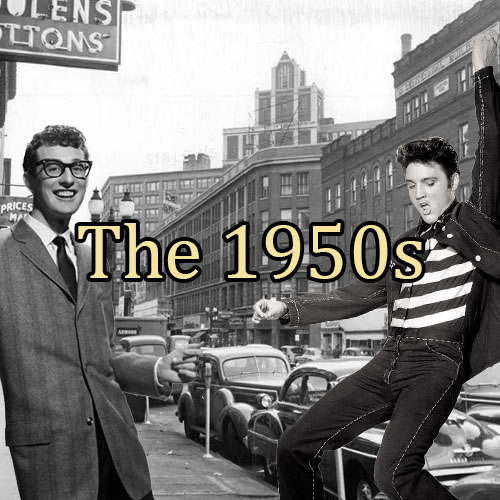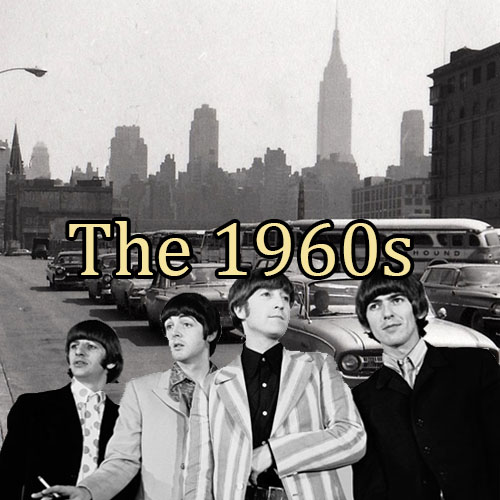The History of the Rock Genre
Rock music has been a dynamic and influential force in the cultural and musical landscape since its inception in the mid-20th century. Each decade has brought unique innovations, styles, and cultural shifts, reflecting and shaping the zeitgeist of its time. From its rebellious roots in the 1950s to its global dominance by the 1980s, rock music has continuously evolved, influencing countless artists and genres. This website explores the rich history of rock music through four pivotal decades: the explosive birth of rock 'n' roll in the 1950s, the transformative British Invasion and counter-culture of the 1960s, the diverse and experimental sounds of the 1970s, and the technological advancements and visual appeal that defined the 1980s. Each era contributed to the enduring legacy of rock music, cementing its place as a cornerstone of modern music and culture.
Click one of these to check out an era and how it shaped this Genre!
The 1950s
The 1950s marked the birth of rock 'n' roll, a genre that revolutionized the music industry and youth culture. Emerging from a fusion of blues, country, jazz, and gospel, rock 'n' roll brought a new, energetic sound characterized by strong rhythms, simple melodies, and the electric guitar. Pioneers like Chuck Berry, Little Richard, and Elvis Presley became icons of the era, with Presley earning the title "The King of Rock 'n' Roll." His provocative performance style and charismatic presence captivated audiences and sparked both enthusiasm and controversy. Songs like Berry's "Johnny B. Goode" and Presley's "Heartbreak Hotel" exemplified the spirited and rebellious nature of rock 'n' roll, resonating deeply with the younger generation.
The cultural impact of rock 'n' roll in the 1950s was profound, breaking racial barriers and fostering greater integration. African American artists gained widespread popularity among white audiences, challenging the segregation norms of the time. This era also saw the rise of the teenager as a distinct cultural group, with rock 'n' roll serving as the soundtrack to their lives. Teenagers found a sense of identity and community in this new music, which celebrated freedom, rebellion, and youthful exuberance. The 1950s set the stage for rock music's enduring legacy, laying the groundwork for its evolution in the coming decades.
The 1960s
The 1960s witnessed rock music's evolution into a more complex and diverse genre. The British Invasion, led by bands like The Beatles and The Rolling Stones, introduced a new wave of rock to America, blending rock 'n' roll with British pop sensibilities. The Beatles, with their innovative songwriting and recording techniques, revolutionized the music industry, while The Rolling Stones brought a raw, blues-infused sound that captivated audiences. This period also saw the emergence of subgenres such as folk rock, psychedelic rock, and blues rock. Bob Dylan's transition from folk to electric rock, The Byrds' jangly guitars, and Jimi Hendrix's groundbreaking guitar work expanded the musical and lyrical boundaries of rock.
The countercultural movement of the 1960s, epitomized by the Woodstock Festival in 1969, showcased rock's role in social and political change. Rock music became a vehicle for artistic expression and a voice for a generation seeking change, addressing issues such as civil rights, the Vietnam War, and personal freedom. The decade also saw the rise of concept albums, where artists like The Beatles with "Sgt. Pepper's Lonely Hearts Club Band" and The Who with "Tommy" created cohesive narratives that pushed the boundaries of what a rock album could be. The 1960s solidified rock music as a powerful force in both the musical and cultural landscapes.
The 1970s
The 1970s were characterized by the diversification and commercialization of rock music. The era saw the rise of hard rock and heavy metal, with bands like Led Zeppelin, Black Sabbath, and Deep Purple pushing the boundaries of volume and intensity. Led Zeppelin's epic compositions and guitar riffs, Black Sabbath's dark themes and heavy sound, and Deep Purple's virtuosic musicianship set the stage for the metal genre. Progressive rock bands such as Pink Floyd, Genesis, and Yes experimented with complex compositions, elaborate live shows, and philosophical themes, creating a more cerebral listening experience.
Meanwhile, the punk rock movement, with its raw energy and DIY ethos, offered a stark contrast to the excesses of mainstream rock. Bands like The Ramones, The Sex Pistols, and The Clash brought a stripped-down, rebellious sound that resonated with disaffected youth. The decade also witnessed the advent of arena rock, where bands like Queen, Aerosmith, and AC/DC played to massive audiences, cementing rock's status as a dominant force in popular music. Queen's theatrical performances, Aerosmith's bluesy hard rock, and AC/DC's high-voltage energy exemplified the grandeur and spectacle of 1970s rock. The diversity and innovation of rock in the 1970s ensured its continued relevance and appeal.
The 1980s
The 1980s brought about significant changes in rock music, influenced by technological advancements and the rise of MTV. The advent of music videos transformed how audiences consumed music, with visual appeal becoming as important as sound. Glam metal bands like Mötley Crüe, Bon Jovi, and Def Leppard epitomized the decade's flashy, hedonistic style, characterized by big hair, extravagant fashion, and anthemic choruses. These bands dominated the charts and filled stadiums with their electrifying performances.
At the same time, new wave bands such as Duran Duran, The Police, and Depeche Mode incorporated synthesizers and electronic elements, creating a sleek, modern sound that defined the era. The 1980s also saw the rise of alternative rock, with bands like R.E.M., The Smiths, and The Cure laying the groundwork for the grunge movement of the early 1990s. These bands offered a more introspective and unconventional approach to rock, addressing themes of alienation and disillusionment.
The 1980s were also marked by the emergence of stadium rock acts like U2 and Bruce Springsteen, whose anthemic songs and socially conscious lyrics resonated with a global audience. U2's soaring sound and Springsteen's heartland rock captured the spirit of the times, ensuring rock's continued relevance and adaptability. The decade's blend of technological innovation, visual spectacle, and musical diversity solidified rock's place as a cornerstone of modern music, setting the stage for its continued evolution in the decades to come.






